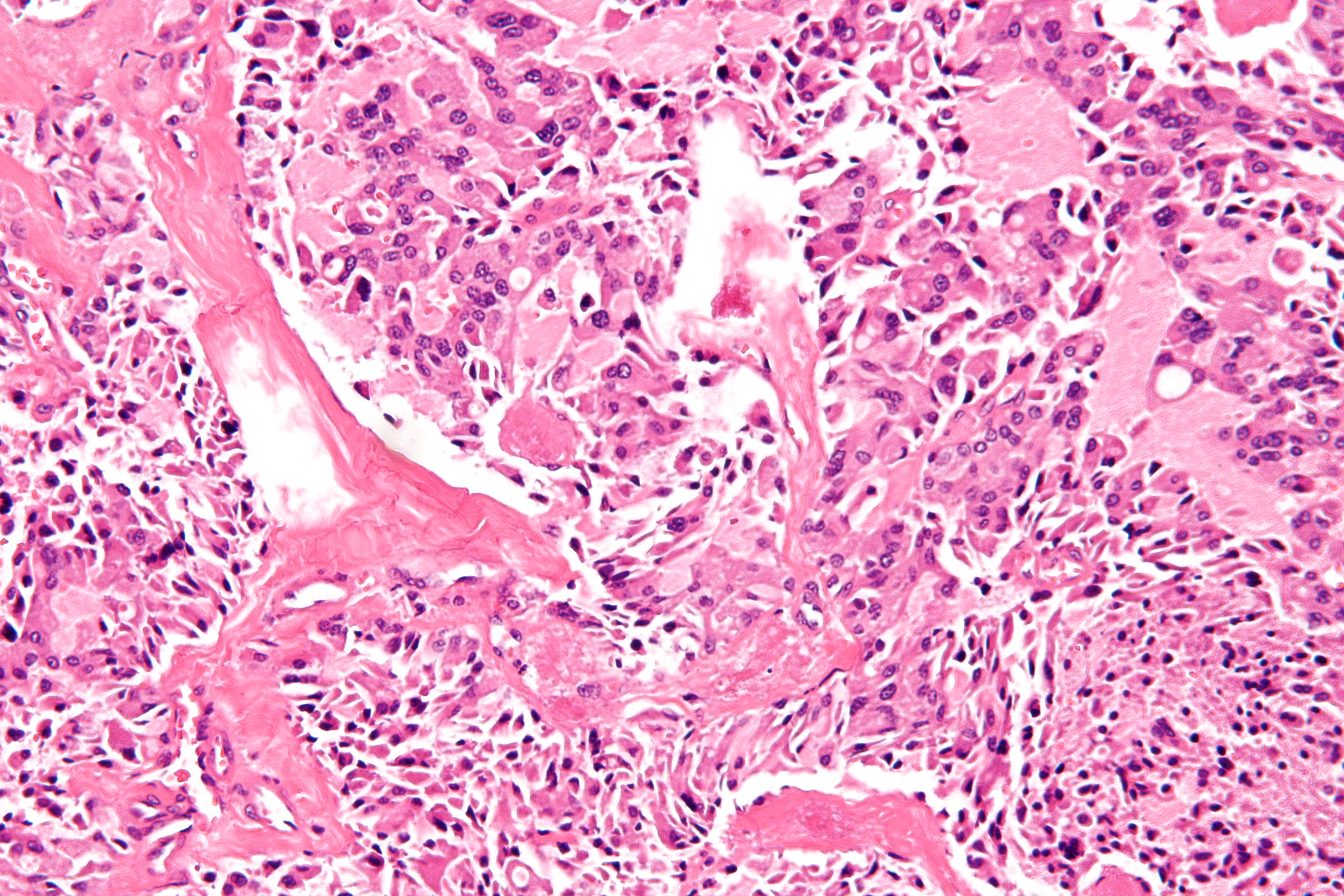Medullary carcinoma

Editor-In-Chief: Prab R Tumpati, MD
Obesity, Sleep & Internal medicine
Founder, WikiMD Wellnesspedia &
W8MD's medical weight loss NYC, sleep center NYC
Philadelphia medical weight loss and Philadelphia sleep clinics
| Medullary carcinoma | |
|---|---|

| |
| Synonyms | Medullary thyroid carcinoma |
| Pronounce | N/A |
| Specialty | N/A |
| Symptoms | Neck mass, hoarseness, dysphagia, diarrhea |
| Complications | Metastasis, paraneoplastic syndrome |
| Onset | Typically in adulthood |
| Duration | Long-term |
| Types | Sporadic, familial |
| Causes | Genetic mutation in the RET proto-oncogene |
| Risks | Multiple endocrine neoplasia type 2 |
| Diagnosis | Fine needle aspiration, ultrasound, calcitonin levels |
| Differential diagnosis | Papillary thyroid carcinoma, follicular thyroid carcinoma |
| Prevention | Prophylactic thyroidectomy in high-risk individuals |
| Treatment | Surgery, radiation therapy, chemotherapy |
| Medication | Tyrosine kinase inhibitors |
| Prognosis | Variable, depends on stage and spread |
| Frequency | Rare, 3-5% of all thyroid cancer cases |
| Deaths | N/A |
Medullary carcinoma is a type of cancer that originates from the medulla of various organs. It is most commonly associated with the thyroid gland, but can also occur in the breast, colon, and other organs.
Introduction[edit]
Medullary carcinoma is a distinct type of cancer that is characterized by the production of calcitonin, a hormone that helps regulate calcium levels in the body. This type of cancer is often associated with certain genetic syndromes, such as Multiple Endocrine Neoplasia type 2 (MEN2).
Types[edit]
There are several types of medullary carcinoma, including:
- Medullary thyroid carcinoma: This is the most common type of medullary carcinoma. It accounts for about 4% of all thyroid cancers and is often associated with MEN2.
- Medullary breast carcinoma: This is a rare type of breast cancer that is characterized by a distinct cellular pattern.
- Medullary colon carcinoma: This is a rare type of colon cancer that is often associated with a better prognosis than other types of colon cancer.
Symptoms[edit]
The symptoms of medullary carcinoma can vary depending on the organ affected. Common symptoms can include a lump in the neck (for thyroid medullary carcinoma), changes in bowel habits (for colon medullary carcinoma), or changes in the breast (for breast medullary carcinoma).
Diagnosis[edit]
Diagnosis of medullary carcinoma often involves a combination of physical examination, imaging tests, and biopsy. Genetic testing may also be performed, particularly for individuals with a family history of medullary carcinoma or MEN2.
Treatment[edit]
Treatment for medullary carcinoma typically involves surgery to remove the tumor. Additional treatments, such as radiation therapy or chemotherapy, may also be used depending on the stage and location of the cancer.
Prognosis[edit]
The prognosis for medullary carcinoma can vary depending on the type and stage of the cancer, as well as the individual's overall health. Early detection and treatment can improve the prognosis.
Ad. Transform your life with W8MD's Budget GLP-1 injections from $49.99


W8MD offers a medical weight loss program to lose weight in Philadelphia. Our physician-supervised medical weight loss provides:
- Weight loss injections in NYC (generic and brand names):
- Zepbound / Mounjaro, Wegovy / Ozempic, Saxenda
- Most insurances accepted or discounted self-pay rates. We will obtain insurance prior authorizations if needed.
- Generic GLP1 weight loss injections from $49.99 for the starting dose of Semaglutide and $65.00 for Tirzepatide.
- Also offer prescription weight loss medications including Phentermine, Qsymia, Diethylpropion, Contrave etc.
NYC weight loss doctor appointmentsNYC weight loss doctor appointments
Start your NYC weight loss journey today at our NYC medical weight loss and Philadelphia medical weight loss clinics.
- Call 718-946-5500 to lose weight in NYC or for medical weight loss in Philadelphia 215-676-2334.
- Tags:NYC medical weight loss, Philadelphia lose weight Zepbound NYC, Budget GLP1 weight loss injections, Wegovy Philadelphia, Wegovy NYC, Philadelphia medical weight loss, Brookly weight loss and Wegovy NYC
|
WikiMD's Wellness Encyclopedia |
| Let Food Be Thy Medicine Medicine Thy Food - Hippocrates |
Medical Disclaimer: WikiMD is not a substitute for professional medical advice. The information on WikiMD is provided as an information resource only, may be incorrect, outdated or misleading, and is not to be used or relied on for any diagnostic or treatment purposes. Please consult your health care provider before making any healthcare decisions or for guidance about a specific medical condition. WikiMD expressly disclaims responsibility, and shall have no liability, for any damages, loss, injury, or liability whatsoever suffered as a result of your reliance on the information contained in this site. By visiting this site you agree to the foregoing terms and conditions, which may from time to time be changed or supplemented by WikiMD. If you do not agree to the foregoing terms and conditions, you should not enter or use this site. See full disclaimer.
Credits:Most images are courtesy of Wikimedia commons, and templates, categories Wikipedia, licensed under CC BY SA or similar.
Translate this page: - East Asian
中文,
日本,
한국어,
South Asian
हिन्दी,
தமிழ்,
తెలుగు,
Urdu,
ಕನ್ನಡ,
Southeast Asian
Indonesian,
Vietnamese,
Thai,
မြန်မာဘာသာ,
বাংলা
European
español,
Deutsch,
français,
Greek,
português do Brasil,
polski,
română,
русский,
Nederlands,
norsk,
svenska,
suomi,
Italian
Middle Eastern & African
عربى,
Turkish,
Persian,
Hebrew,
Afrikaans,
isiZulu,
Kiswahili,
Other
Bulgarian,
Hungarian,
Czech,
Swedish,
മലയാളം,
मराठी,
ਪੰਜਾਬੀ,
ગુજરાતી,
Portuguese,
Ukrainian


